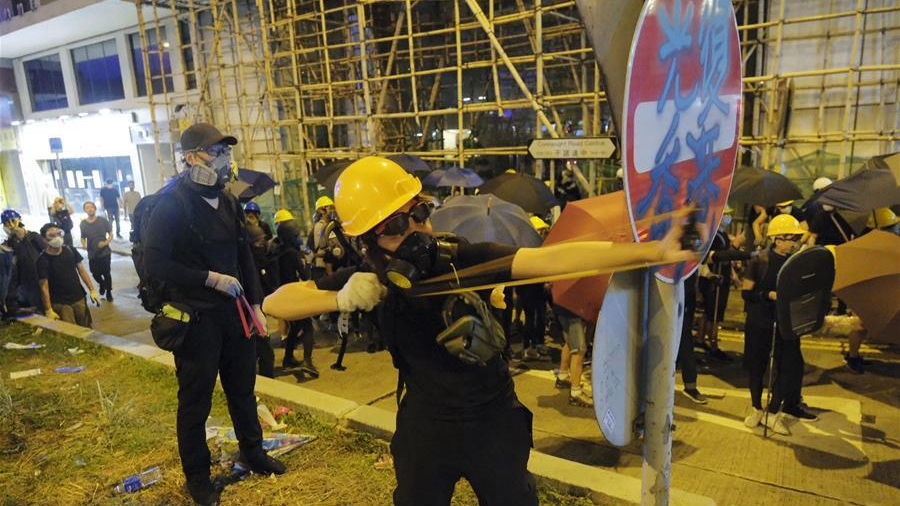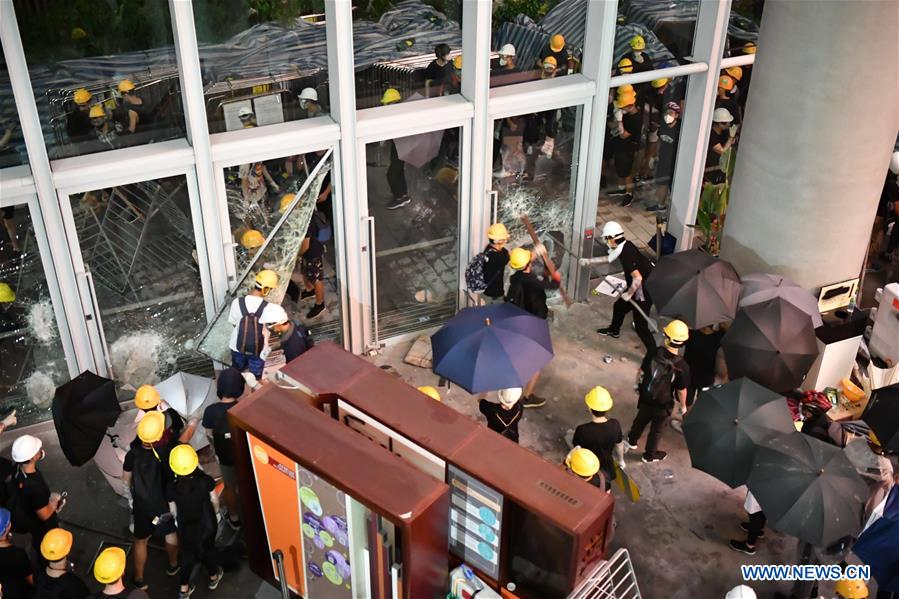

Editor’s note: This article was translated from a piece published in the WeChat public account Xiake Island, based on an interview with Professor Cheung Yung-nien at the National University of Singapore. The article reflects the author's opinions, and not necessarily the views of CGTN.
In any large-scale social movement or protest, among the large number of participants, there is hardly any solid cohesion or one single voice. Instead, there must be different views and voices. Yet one cannot see the different agendas and actions by just watching the news.
It can be said that over the years, social movements are not uncommon in Hong Kong. Not all of them were separationist, but separationist voices did exist; not all of them were violent, but violence did exist. If the backbone of social movements in earlier years consisted of the “pro-Democratic camp” and students, the makeup of present-day protesters has become more complex, with external forces playing an important role. It is worth noting that although it was a small number of people who were violent, they played a significant role. Those people were accustomed to hit-and-run, utterly irresponsible.
However, in any rational and law-based society, people should be responsible for their deeds. Most of those violent protesters who encourage radicalization and sabotage hold British or other foreign passports, which means they can fly out of Hong Kong at any time. Hong Kong people must realize that those radical people, instead of representing the interests of Hong Kong, are doing nothing but undermining and hijacking the interests of Hong Kong while seeking their own agenda.
The violent protesters have zero respect for the law. When it is good for them, they use the law as an instrument to protect themselves; when the odds are against them and they think the law is in their way, they trample on it.
Who are the Hong Kong people that can best represent the interests of Hong Kong? Certainly not those who hold more than one passport and do not identify with Hong Kong. The problem now is that those who love Hong Kong cannot make their voice heard. Therefore, the political reform in Hong Kong has to be redesigned.
In the past, we criticized colonial education, but colonial education has become even worse, especially with those born after 1997. In the past, the “pro-Democratic camp” in Hong Kong opposed the British colonial authorities in Hong Kong, but now they almost regard the Chinese mainland as a colonial equivalent. This is a serious problem of identity.

Violent radicals attempt to break and enter the Legislative Council building in Hong Kong, China, July 1, 2019. /Xinhua Photo
The older generation of Hong Kong people, who grew up under the British colonial rule, identified with China. But that sense is gone now and is even being replaced by a reverse sense of identity.
Hong Kong people of the generation today are no longer the same as their fathers and grandfathers. The high degree of autonomy under “One Country, Two Systems” presupposes identifying with both Hong Kong and China. But the violent protesters today made us doubt whether it is still possible for them to identify with Hong Kong without identifying with China, for they can just have a career as violent protesters flying in and out of Hong Kong as they like.
The violent protesters did not identify with Hong Kong at all. “Save Hong Kong” was nothing more than a slogan they used to attract attention. If violence was the only problem with the social movement they launched, it is not difficult to solve. But if the basis of their violence was the issue of identity, it is difficult to solve. That’s why I say regarding Hong Kong’s return to Chinese sovereignty, they only fulfilled the first return in 1997, which was in terms of sovereignty, while the second return, in terms of identity, is yet to be fulfilled after this 2019 incident.
Some say that Hong Kong has become a pawn in the ongoing full-scale trade war between China and the United States. There is nothing to worry about on this. First, China will not compromise. China will not compromise in business and trade at the cost of its sovereign interests. Second, as an economic, trade and financial center, the stability of Hong Kong is in the interests of both China and the West in general.
What the violent protesters have been doing will amount to nothing. Hong Kong faces a lot of constraints, and most people know well that Hong Kong is inseparable from the Chinese mainland. Those radical people simply took advantage of Hong Kong’s position as an international metropolis. They should see that U.S. President Donald Trump shows no intention of interfering and hopes Hong Kong can work it out by itself. Any social movement has peak and trough days, and there are bound to be some die-hard followers. Personally, I think that this social movement in Hong Kong will go downward; the only issue is that it is creating too much workload for the Hong Kong police.
Therefore, the people of Hong Kong and those who love Hong Kong should be aware that they have the right to protect themselves and protect Hong Kong from being damaged. They should step forward and safeguard their own interests instead of watching those violent protesters cause damage. It should become clear to everyone that love for Hong Kong presupposes love for China, as this is where the interests of Hong Kong rest.
(If you want to contribute and have specific expertise, please contact us at opinions@cgtn.com.)

Copyright © 2018 CGTN. Beijing ICP prepared NO.16065310-3
Copyright © 2018 CGTN. Beijing ICP prepared NO.16065310-3